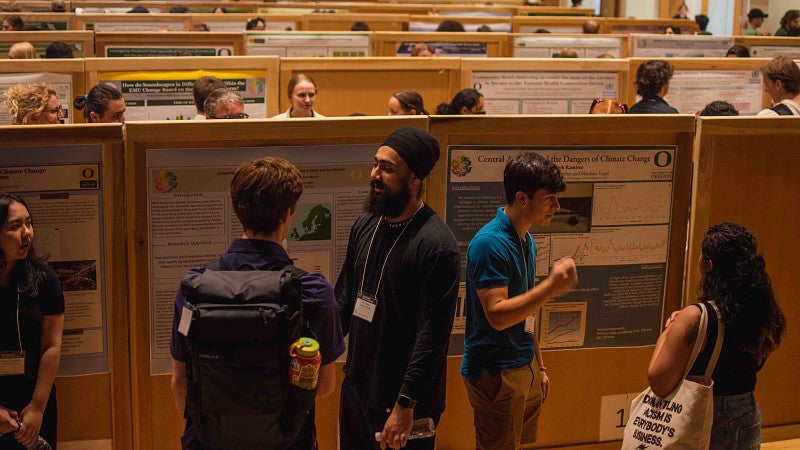
In a filled EMU ballroom, University of Oregon students eagerly shared the research they have been working on at the 2023 Undergraduate Research Symposium on May 25.
Most of the poster presenters hailed from the College of Arts and Sciences and they reflected the diverse disciplines within the college, showcasing work conducted by individual students, as well as collective research. Since 2011, the annual event has been a place for undergraduate students to share their research with the wider academic community.
Jena Miko is a part of the Language Center Lab, led by Department of Psychology Assistant Professor Caitlin Fausey. During her second week in the lab, Miko said that she had the idea to research how infants interacting with toys influences their language learning, which inspired her to undertake the research project.
“I’ve worked with kids and I see infants playing with things when I’m working, and I thought there had to be a relationship with language,” Miko said.
Miko has been working on the research project since the spring 2022 term, and the research team she’s a part of is preparing to start its research inside the homes of participating parents. What the research team expects to find is that infants encounter various objects throughout the home but repeatedly play with a few, which is associated with learning vocabulary.
Kevin Costner’s Dances with Wolves, an epic western film, has won several Academy Awards and received acclaim for using the Lakota language. But how has Hollywood and the film industry changed since the movie's premiere? Tom Farrenkopf of cinema studies explored how Native Representation has changed over the past 30 years.
Farrenkopf found that Native American representation in cinematic hubs — such as Los Angeles and New York City — is still minimal. But he said there has been an increase in Native American film production companies being established throughout the country.
The history of WWI is often spoken about regarding battles and political decisions but not how it affected people living in Europe, said Raegan Scheer and Katelyn Kelm, two students presenting on behalf of a class-wide project by the History course History 428 “Topic: World War I.”
The class researched primary sources — such as diaries and journals — of individuals living in Europe during the war to understand how violence and political factors affected everyday people.
“These were people who were affected by the war,” Scheer said. “They had no choice or no say in how it played it out. They just had to live with it — all classes. No one was left unscathed.”
—By Henry Houston, College of Arts and Sciences
